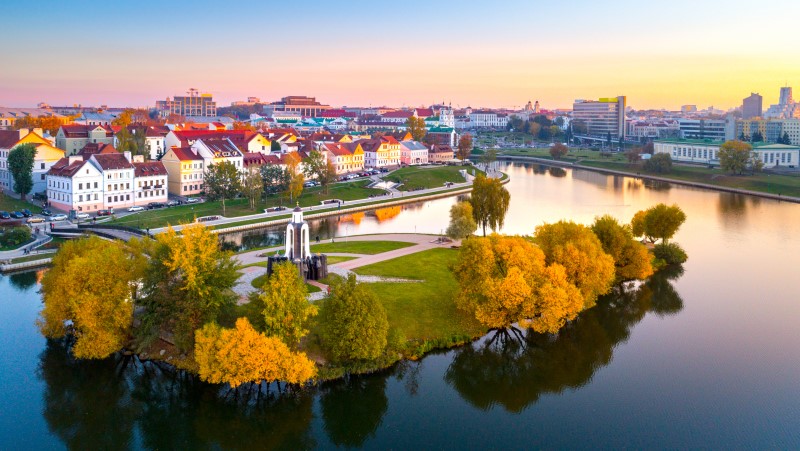I thought it was beyond the veil of absurdity when the Western media was talking about bringing “freedom” to foreign countries as they were working to silence the speech rights of the likes of myself and Alex Jones.
However, in a time when we’re being forced by the state to wear masks, banned from working, tracked and traced everywhere we go, and under threat of forced vaccination, this plan to spread “freedom” to the “unfree” savages of the earth has become like slapstick comedy.
Attacking Belarus – a nation who didn’t do the lockdown and allowed the people to maintain their freedoms – as “not free” is the peak form of this.
Oxford Professor Timothy Garton Ash writes for The Guardian:
Events in Belarus now join a long line of anti-Soviet and anti-post-Soviet protest movements – some of which succeeded, some of which failed. “Colour revolutions” is a flimsy, politically compromised term that offers much too short a perspective. Since Belarus is the most Soviet of all the post-Soviet states, you can reach back even as far as the East German protests in 1953. When you see workers in large state factories confronting Alexander Lukashenko face to face, and reportedly forming an inter-factory strike committee, you are in Poland in 1980. Or perhaps it’s more like Armenia in 2018? Or Ukraine in 2014? Or – the unavoidable reference – the central European revolutions of 1989? And don’t forget that Belarusians themselves have tried several times before. This is not the first election Lukashenko has falsified.
They’re just stating as a fact now that this man somehow managed to “falsify” an 84% victory in an internationally observed election. They’ve flown on past “suspected” and “alleged.”
Every time, we recognise elements from earlier instances of civil resistance, but there is always something new. Here it is the role of the “women in white” who join hands in human chains of non-violent protest and make a perfect theatrical contrast to Lukashenko, that pig-headed epitome of the chauvinist bully.
The nonviolence of the protests also contrasts with something else I’ve seen recently maybe, but I don’t recall what it was specifically.
To try to guess how this will end is a fool’s errand. In such moments, nobody knows what is going to happen this afternoon, let alone tomorrow. But it is not too soon to spell out one clear message from the streets of Belarus.
In a review of Anne Applebaum’s new book, Twilight of Democracy, the political scientist Ivan Krastev admonishes her – and us – not to make the ideals and “self-evident truths” of 1989 the starting point for remaking today’s world. This all depends what you think was the “self-evident truth” of 1989. If you think it was that history would unfold smoothly and inevitably towards western-type liberal democracy, then obviously that was and would always be mistaken.
The idea that any political doctrine could ever be “self-evidently true” is a concept so foul and haughty that only a Jew like Applebaum could ever invent it.
The thing that was self-evidently true in 1989 was that Perestroika failed. The rest of it is open for debate.
I personally would love Belarus to become a liberal democracy, secure inside both the EU and Nato like its Baltic neighbours. But that will not happen any time soon, mainly because Vladimir Putin won’t let it, but also because there is currently no majority for it in the country itself. The Belarusian opposition wisely insists this is not a geopolitical struggle between Russia and the west.
In Minsk a few years ago, I heard the Belarusian foreign minister evoke the shimmering prospect of Belarus becoming a prosperous neutral country between the EU and Russia, “something like Switzerland”. Who wouldn’t settle for being Switzerland? Yet realistically, a messy, negotiated transition to another, less autocratic leadership, as in Armenia, is probably the best we can hope for in the near future – and with Lukashenko, things may get worse before they get better.
…
The self-evident truth of 1989 was that people who live for a long time under a dictatorship usually end up longing for freedom. And one day, they speak. “People are tired of lies, of not having freedom of speech,” says Aleksandr, 41, an electricity worker. “We are celebrating freedom from dictatorship,” says Marni, 23, a cafe owner. “A new collective spirit has woken and that spirit can never be put back in the bottle,” says Lesya, 24, an anaesthetist. Here is the people’s poetry, which will of course be followed by disappointing prose.
Again: the collapse of communism was an economic issue.
What freedoms do people in Belarus not have, specifically?
What are we talking about here?
I know which freedoms I don’t have in America, and Belarus has all of these freedoms that I am lacking.
This entire narrative is stupid. Belarusian protesters at factories were indeed like the protesters of 1989, in that they were complaining about an economic situation. Vague, generalized “freedom” is not something that anyone on earth cares about. People do care about specific freedoms, but none of the lunatics compiling this narrative about Belarus will list any specific freedoms they’re lacking.
And now we have Cai Xia, a former professor at China’s Central Party School, no less, telling the Guardian that change in the direction of democracy will one day come in China, too, because “people yearn for freedom and freedom is only possible when people’s rights are protected, right?” Not for the first time, it takes those with long experience of unfreedom to remind us of the value and attraction of freedom.
When rightly dissecting the many failings of liberal democracy over the last 30 years, we risk falling into a kind of historical fatalism: a “twilight” of democracy, after all, must logically be followed by night. That would be to make the “here’s the direction of history” mistake once again, only in the opposite direction, and to give authoritarian rulers an undeserved and significant psychological advantage. Call me an American if you like, but I think we should believe more in the power of freedom – not least because that belief is itself a large part of freedom’s power.
You see, what they do is this: they turn “freedom” into a kind of voodoo doctrine, where they decide that certain countries have it and certain countries don’t. “Freedom” effectively means nothing other than “controlled by Jews.”
Freedom of speech is the only specific freedom mentioned in this article (and that in the form of a quote from a protester) – well, let me tell you about freedom of speech in the West: it does not exist. It is an absolute hoax. At this point, it is effectively impossible to criticize any powerful group or institution of power in any way at all.
There is zero chance that people in Belarus have less freedom of speech than people in the United States or Britain. Anyone who says that is lying on purpose.
The rest of these vague notions of freedom will need to be explicated further before I can give comment. Though I will not be holding my breath.
What would make sense if you were writing an article about how there is no freedom in Belarus would be to go through and list examples exemplifying the lack of freedom in different areas. Any writer knows that and an Oxford professor knows that. The fact that it was not done in this op-ed means that Timothy Garton Ash knows that there is not “less freedom” in Belarus.
He’s lying on purpose.

